Explore the captivating tales of the Bible's most infamous women, whose stories of deceit and power will challenge your perceptions of villainy.
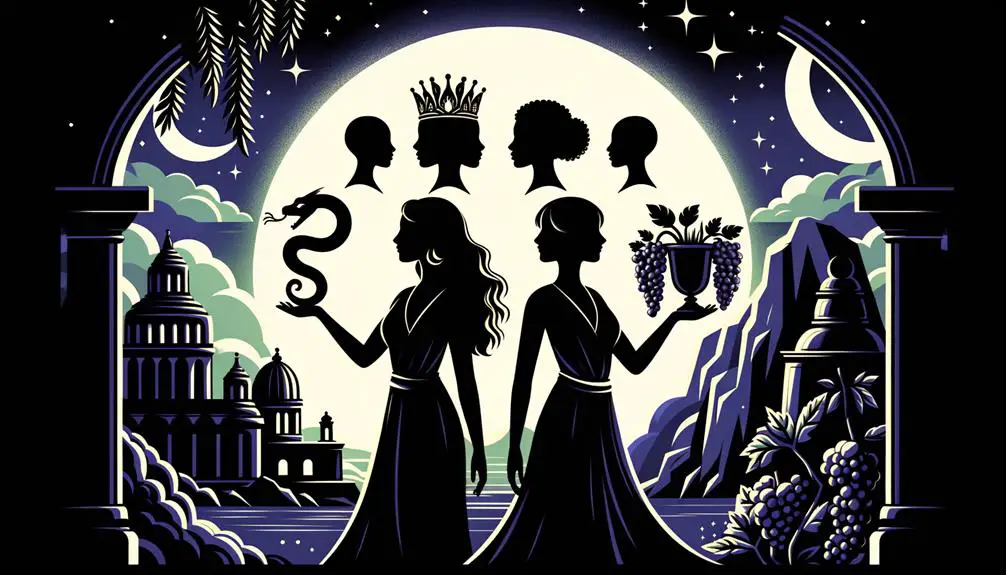
Wicked Women in the Bible
You might not be aware, but the Bible isn't just a source of spiritual guidance; it's also a treasure trove of stories about women who've left a mark, not always for the noblest reasons.
From Eve, whose curiosity changed the fate of humanity, to Jezebel, who took manipulation to divine levels, these figures embody complex narratives of power, betrayal, and rebellion.
As you explore their stories, you'll find that they're not just emblems of wickedness but are layered with motivations and consequences that might challenge your understanding of right and wrong.
Curiosity piqued? There's much more to uncover about these enigmatic characters.
Key Takeaways
- The Bible portrays women like Jezebel and Athaliah using power for personal and political gains, often challenging male authority.
- Figures such as Delilah and Potiphar's Wife demonstrate how personal desires and vendettas can lead to moral and societal downfall.
- Herodias and Salome's narratives highlight the dangers of manipulation and the use of allure in achieving political and personal vengeance.
- Stories of women like the Witch of Endor reveal societal fears and fascinations with the unknown, delving into ethical and spiritual dilemmas.
Eve: The Original Sin

Eve's encounter with the serpent in the Garden of Eden marks a pivotal moment in biblical history, often cited as the inception of original sin. This narrative, deeply embedded in religious and cultural discourses, has been instrumental in shaping perceptions of gender roles within society. You're drawn into a complex interplay of disobedience, temptation, and consequence, yet, through a scholarly lens, one must also recognize the dimension of original virtue that precedes the act often labeled as sin.
Analyzing Eve's actions, it's imperative to acknowledge the context of curiosity and desire for knowledge that led to the fateful decision. This pursuit, albeit resulting in expulsion from Eden, also illuminates her agency and autonomy, challenging traditional gender roles that often confine women to passive or subordinate positions. Eve's narrative, when dissected with objectivity, suggests a more nuanced understanding of her role, not merely as the progenitor of original sin but as a figure embodying original virtue—her actions stemming from a place of exploration and aspiration.
Furthermore, the repercussions of Eve's encounter with the serpent extend beyond her immediate circumstances, influencing the construction and perpetuation of gender roles throughout biblical narratives and beyond. However, by revisiting these stories with a critical eye, you're invited to ponder the complexities of these characters beyond their traditional vilification. Eve's story, rich in themes of autonomy, consequence, and resilience, challenges you to reconsider the simplistic binary of virtue and sin, inviting a more inclusive appreciation of her role and, by extension, the representation of women in foundational texts.
Jezebel: Power and Idolatry
Shifting focus from the narrative of Eve, we now examine Jezebel, a figure whose story intertwines power dynamics and idolatry, challenging traditional perceptions of female roles in the biblical context. Jezebel's actions and the resultant consequences serve as a critical analysis point, especially when considering Ahab's influence and the prophetic confrontations she faced.
To paint a clearer picture, consider these three key aspects of Jezebel's story:
- Ahab's Influence: Jezebel, married to King Ahab of Israel, significantly impacted his reign. Her fervent worship of Baal influenced Ahab, leading to the establishment of Baal worship across Israel. This not only shifted the religious landscape but also highlighted the power Jezebel wielded from behind the throne, challenging the male-dominated leadership narrative prevalent in her time.
- Prophetic Confrontation: Jezebel's confrontation with the prophets, especially Elijah, underscores her role in the tension between the worship of Yahweh and Baal. Her attempts to kill the prophets of Yahweh, culminating in the dramatic contest on Mount Carmel, showcase her commitment to her deity and her willingness to challenge prophetic authority directly.
- Idolatry and Political Power: Jezebel's advocacy for Baal worship wasn't merely religious but also a political move to consolidate power. By promoting her religion, she aimed to strengthen her and Ahab's rule, demonstrating how religious and political power can intertwine, leading to significant social and spiritual ramifications.
Jezebel's story, marked by Ahab's influence and prophetic confrontations, illustrates the complexities of idolatry and power dynamics, offering a nuanced perspective on the intersections of faith, power, and gender in the biblical narrative.
Delilah: Betrayal for Silver
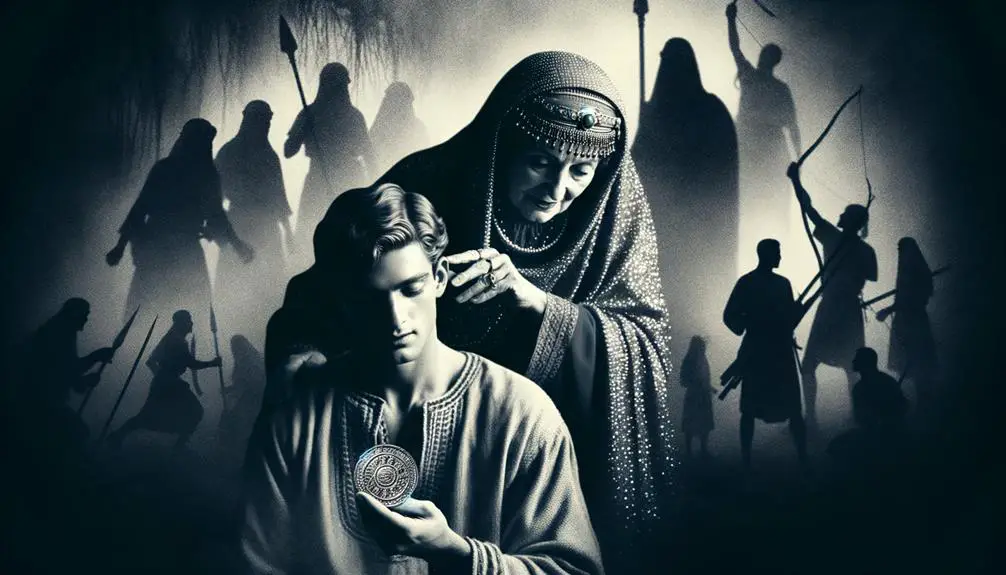
Delilah's story, emblematic of betrayal for personal gain, starkly contrasts with other women's narratives in the Bible, revealing complex motivations and the profound impact of individual choices on historical and spiritual narratives. She's infamously known for her role in Samson's downfall, a tale that has been scrutinized and interpreted through various cultural lenses over centuries. Delilah's actions—betraying Samson for silver—highlight a narrative where personal gain outweighs loyalty and love, offering a rich ground for analysis on the nature of betrayal and its consequences.
Your exploration into this narrative reveals a multifaceted character whose motivations go beyond mere monetary gain. Cultural interpretations of Delilah have ranged from viewing her as a mere antagonist in Samson's story to understanding her as a complex figure navigating her survival in a patriarchal society. This variance in interpretation underscores the complexity of biblical narratives and the characters within them, suggesting that Delilah's actions might reflect broader societal themes rather than purely individual moral failings.
Analyzing Delilah's choice to betray Samson for silver, you delve into the socio-economic pressures that might've influenced her decisions. This perspective offers a nuanced understanding of her actions, suggesting that they can't be solely attributed to personal greed or malice. Instead, Delilah's story serves as a cautionary tale about the destructive potential of allowing personal desires to overshadow moral compasses, illustrating the timeless relevance of biblical narratives in discussing human nature and societal issues.
Potiphar's Wife: False Accusations
In analyzing the narrative of Potiphar's wife, it becomes evident that her false accusations against Joseph stand as a pivotal moment, revealing the power dynamics and societal structures that could dictate the course of an individual's life in biblical times. This incident underscores the complex interplay of gender dynamics and the ancient justice systems, offering a lens through which to examine the broader implications of such narratives.
- Gender Dynamics: Potiphar's wife's actions highlight the limited avenues of power available to women in ancient societies. Despite her high social standing, her voice gains significance only through the manipulation of her husband's authority. This act of false accusation demonstrates how gender roles could be both a tool and a trap, leveraging societal norms for personal vendettas while reinforcing the subordinate position of women.
- Ancient Justice Systems: The swift and severe reaction to the accusations against Joseph reflects the workings of ancient justice systems, where the word of a higher social class individual could seal the fate of someone less powerful without thorough investigation. This underscores the vulnerability of individuals to the whims of those above them in the social hierarchy.
- Power Dynamics: The narrative serves as a stark reminder of the precarious nature of individual power and status. Joseph, despite his integrity and service, finds his life upended by a single, unproven claim. This moment illustrates the fragility of personal security in the face of societal and familial power structures.
Through the lens of Potiphar's wife's false accusations, we grasp the intricate web of gender dynamics, ancient justice systems, and power relations that shaped lives and narratives in biblical times.
Athaliah: A Queen's Rebellion
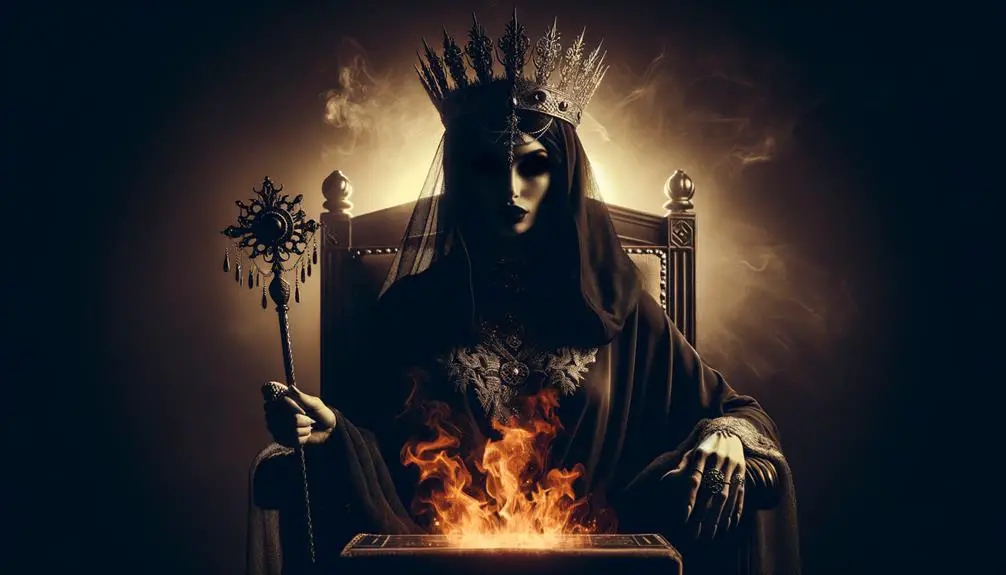
As you explore the narrative of Athaliah in the Bible, you encounter a unique instance of female sovereignty marked by ambition and controversy. Her rise to power, often depicted as a rebellion against the established patriarchal order, sets the stage for a tumultuous reign characterized by strategic eliminations and religious confrontations.
Athaliah's eventual downfall and the impact on her legacy prompt a reevaluation of her role and the dynamics of power and gender in biblical history.
Athaliah's Rise to Power
Athaliah's ascension to power, marked by strategic maneuvering and ruthless ambition, fundamentally altered the political landscape of ancient Israel. Her story is a testament to how maternal lineage and religious conflicts played pivotal roles in her rise.
- Maternal Lineage: Athaliah, daughter of Ahab and Jezebel, leveraged her royal Phoenician lineage, asserting her claim to power in a patriarchal society. This heritage provided her with a unique political and religious perspective.
- Religious Conflicts: She capitalized on the existing religious tensions between the worship of Baal and Yahweh, aligning with Baal worshippers to consolidate her power base.
- Strategic Alliances: Athaliah formed alliances within the court and military, ensuring loyalty through political marriages and appointments, thus securing her position on the throne.
Her rise to power is a complex narrative of ambition, strategy, and the utilization of inherent advantages.
Reign of Terror
Upon ascending to the throne, Athaliah's reign swiftly evolved into a period marked by violent suppressions and strategic eliminations to consolidate her power. Her actions, while stark, can't be viewed in isolation. The cultural context of her time was fraught with power struggles, necessitating harsh measures by rulers to secure their thrones.
Aspect |
Cultural Context |
Modern Interpretations |
|---|---|---|
Power Dynamics |
Survival in a male-dominated realm |
Reflections on leadership styles |
Violence |
Commonplace in royal successions |
Critique of methods for power |
Gender |
Unique as a ruling queen |
Analysis of gender roles in power |
In modern interpretations, Athaliah's story prompts a reevaluation of historical narratives, challenging readers to consider the complexities behind her reign of terror within her socio-political environment.
Downfall and Legacy
While exploring Athaliah's reign reveals the complex interplay of power and gender, her downfall and legacy further illuminate the consequences of her actions within the broader historical and cultural narrative.
- Moral Interpretations: Athaliah's story is often used to discuss the moral boundaries of leadership and ambition, especially in the context of female rulers in ancient texts. Her downfall serves as a cautionary tale about the dangers of unchecked power and the divine justice that awaits those who transgress moral and divine laws.
- Cultural Impacts: Her legacy has been the subject of extensive analysis, influencing not only religious discourse but also cultural representations of female authority and rebellion.
- Historical Relevance: Athaliah's reign and its dramatic end underscore the intricate dynamics of power, gender, and religion in ancient societies, offering valuable insights into the socio-political structures of the time.
Herodias: Vengeance and Murder
Turning your attention to Herodias, you encounter a story of calculated vengeance and cold-blooded murder that stands out within the biblical narrative.
Herodias' vengeful plot against John the Baptist, fueled by personal vendettas, showcases her manipulative prowess.
The request for his beheading, made through her daughter Salome, not only reveals her deep-seated malice but also her ability to use those around her to achieve her deadly goals.
Herodias' Vengeful Plot
Herodias' vengeful plot against John the Baptist epitomizes the intertwining of personal vendettas and political maneuvering in biblical narratives. Her motives, deeply rooted in Herod's manipulation and the complex dynamics of their marriage, highlight how personal grievances can escalate into public acts of vengeance.
- Herod's Manipulation: Herodias exploited Herod's influence, manipulating marital and political dynamics to target John.
- Marriage Dynamics: The unconventional nature of her marriage to Herod, who was also her uncle, intensified scrutiny and criticism, fueling her vendetta.
- Personal Vendetta: Her grudge against John for his condemnation of her marriage became a catalyst for plotting his demise, intertwining personal vendettas with political objectives.
Herodias' story serves as a stark reminder of how personal grievances can be amplified within the context of power and influence.
The Beheading Request
Building on the intricate web of personal vendettas and political intrigue, the climax of Herodias' scheme unfolds with her demand for John the Baptist's beheading. This event encapsulates the entanglement of moral dilemmas and cultural perceptions that characterize her story within the biblical narrative.
Aspect |
Impact on Herodias |
Impact on Society |
|---|---|---|
Moral Dilemmas |
Justifies vengeance |
Challenges ethics |
Vengeful Acts |
Empowerment |
Social discord |
Cultural Perceptions |
Villainized |
Moral reflection |
Herodias' actions, driven by a personal vendetta, not only highlight her as a central figure in a narrative of vengeance and murder but also prompt a deeper examination of the moral and cultural underpinnings of her time. Through her, we explore the complexities of human behavior and the profound consequences that arise from our choices.
The Witch of Endor: Summoning the Dead
In the biblical narrative, the Witch of Endor is famously known for her role in summoning the spirit of the deceased prophet Samuel at the request of King Saul. This event raises significant spiritual implications and ethical dilemmas, marking a critical moment in the history of biblical narratives concerning the interaction between the living and the dead.
- Spiritual Implications: The act of summoning a spirit from the dead was explicitly forbidden in the religious laws of the time, suggesting a deep transgression on both the witch's and Saul's part. This event underscores the tension between established religious norms and the desperation that can lead individuals to seek forbidden knowledge or power.
- Ethical Dilemmas: Saul's decision to consult the Witch of Endor, despite his previous stance against necromancy, highlights the ethical complexities faced by leaders under pressure. His actions raise questions about the lengths to which one might go when faced with despair and the looming threat of defeat.
- Historical and Cultural Context: The narrative of the Witch of Endor provides insight into ancient views on witchcraft, the afterlife, and the boundaries between the living and the dead. It reflects the societal fears and fascinations regarding the unknown and the lengths to which individuals might go to seek guidance from beyond.
Analyzing the story of the Witch of Endor invites a deeper understanding of the ancient world's spiritual beliefs and ethical frameworks. It serves as a cautionary tale about the consequences of stepping beyond the bounds of accepted religious practices and the complexities of human nature when confronted with existential threats.
Salome: The Deadly Dance
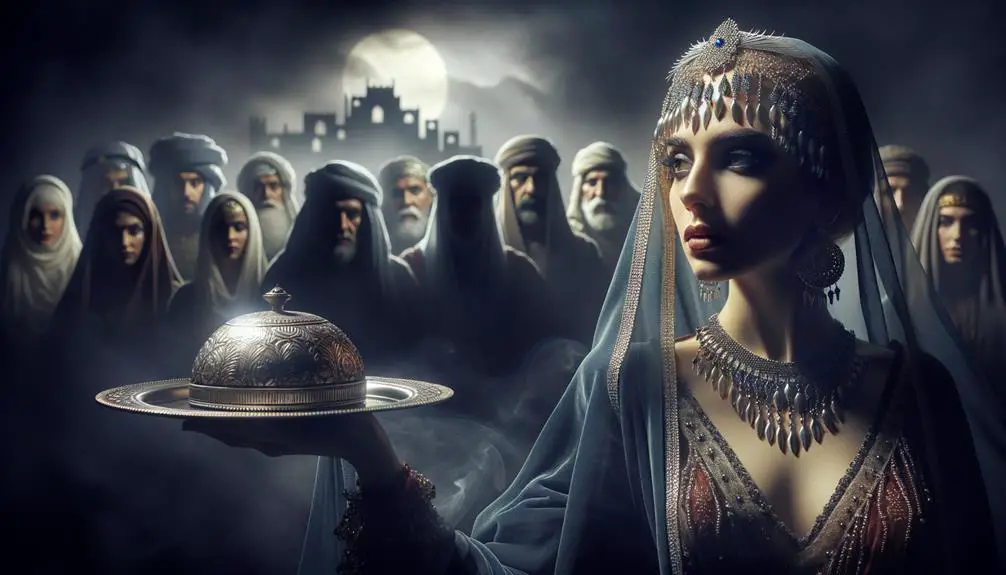
Salome's infamous dance, leading to the beheading of John the Baptist, starkly illustrates the perilous intersection of political intrigue and personal vendetta within the biblical narrative. This episode is not merely a tale of seduction and murder; it's a complex exploration of power dynamics, where dance symbolism and historical context intertwine to reveal deeper truths about manipulation and consequence.
Aspect |
Analysis |
|---|---|
Dance Symbolism |
Salome's dance represents the power of persuasion and the dangerous potential of using one's allure as a political tool. |
Historical Context |
The event occurs against a backdrop of volatile political relationships and religious tension, highlighting the precarious position of women in biblical times. |
Personal Vendetta |
Herodias, Salome's mother, uses her daughter's dance to achieve her own ends, showcasing the lengths individuals will go to for revenge. |
Political Intrigue |
The promise made by Herod, propelled by the dance, showcases the folly of rash vows and the intricate politics of the Herodian court. |
You see, Salome's dance and its aftermath offer a poignant commentary on the interplay between personal desires and political machinations. The historical context sheds light on the societal norms and political tensions of the time, making Salome's actions both a product of her environment and a deliberate act of manipulation. This story serves as a cautionary tale about the consequences of intertwining personal vendettas with political power, where the symbolic act of a dance can lead to irreversible outcomes. Through this lens, Salome's narrative transcends its biblical origins, becoming a timeless reflection on the complexities of human behavior and the unforeseen repercussions of our actions.
Frequently Asked Questions
How Have Interpretations of These "Wicked" Women Evolved in Feminist Theological Discourse?
In feminist theological discourse, interpretations of these so-called 'wicked' women have undergone significant evolution. You'll find that gendered linguistics and archetypal analysis play crucial roles in this shift.
Scholars now often challenge traditional narratives, proposing that these women's stories reflect broader societal attitudes towards gender rather than personal morality. This reevaluation offers a more nuanced understanding of their roles, emphasizing complexity over simplification and highlighting the impact of cultural and historical contexts on their portrayals.
What Cultural or Historical Factors Influenced the Depiction of These Women as Villains in the Bible?
You're exploring how certain characters were cast as villains due to cultural or historical factors. Patriarchal storytelling and societal norms heavily influenced these depictions.
These frameworks often marginalized women's voices and roles, painting them as adversaries or morally corrupt figures within narratives. This perspective wasn't just limited to religious texts but reflected broader societal views on gender roles, power dynamics, and morality, shaping perceptions for centuries.
Are There Any Examples of These Women Being Portrayed Positively or Sympathetically in Other Religious Texts or Folklore?
In the tapestry of global narratives, you'll find that alternative narratives often weave a more sympathetic picture of infamous characters.
For example, folklore adaptations have recast characters traditionally seen in a negative light into roles that highlight their complexity and humanity.
These stories, emerging from various cultures, offer a richer, more nuanced understanding of their actions and motivations, shedding light on how context shapes perception.
How Do Modern Interpretations of These Stories Differ Across Various Christian Denominations?
In modern interpretations, you'll find that ecumenical debates and denominational biases deeply influence how stories are viewed across different Christian denominations. These biases can lead to varied portrayals, with some denominations emphasizing redemption and others focusing on condemnation.
You're also likely to encounter discussions that challenge traditional narratives, offering more nuanced or sympathetic perspectives. Ultimately, the interpretation hinges on the theological priorities and cultural contexts of each denomination.
What Role Do These Stories Play in Contemporary Discussions About Gender and Morality Within Religious Communities?
In contemporary religious communities, discussions about gender and morality often revolve around examining traditional narratives.
You'll find that stories from religious texts play a critical role in shaping gender dynamics and moral standards. They serve as a lens through which modern believers interpret and negotiate the complexities of gender roles and moral behavior.
This reflective process encourages a reevaluation of traditional values in light of contemporary understandings of gender equality and ethical conduct.
Conclusion
In analyzing these biblical narratives, it's clear that the depiction of 'wicked' women serves dual purposes: to caution against moral transgressions and to underscore the societal expectations of women.
Take Jezebel's story as an example; her ambitious grasp for power and idolatry not only highlights the dangers of corruption but also reflects the anxieties surrounding female autonomy in a patriarchal context.
These stories, while ancient, continue to influence contemporary perceptions of women's roles and moral boundaries.


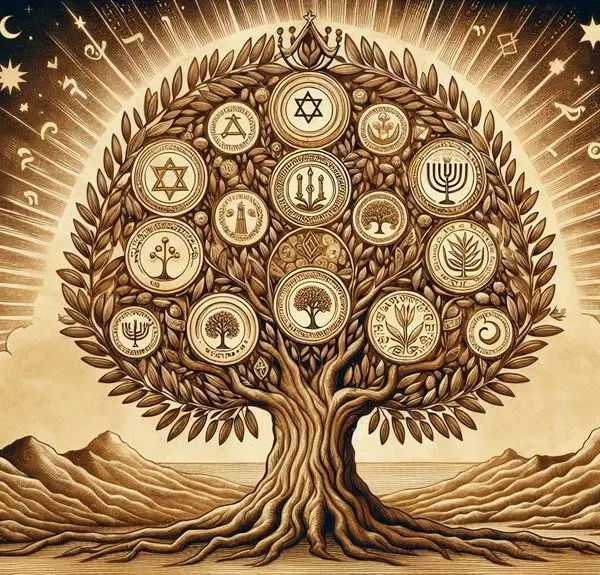
Sign up